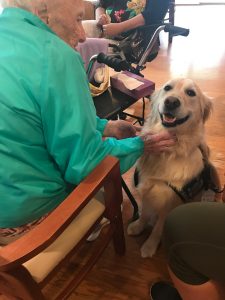Alzheimer’s and Animal-Assisted Therapy

Anyone who owns a pet knows the value of that relationship. Pets offer companionship and love, and even lower blood pressure and heart rate. Increasingly, there are many studies that show how important the person-animal relationship can be for people living with Alzheimer’s.
When Alzheimer’s patients spend time with animals (dogs, cats, fish, birds) through Animal-Assisted Therapy, there is a significant improvement in their quality of life. Studies have shown a decrease in behavioral issues, an ease in agitation and an improved mood. Stress and anxiety are reduced and social interaction increases. There is even building evidence that overall appetite improves.
The reasons seem to be both simple and profound. Emotionally, animals offer unconditional love. They are not judgmental or critical. When one thinks about the changes to a person suffering from Alzheimer’s, their diminishing abilities and understanding, this connection must be comforting. Also, animals often represent safety and security. Having a dog by your side makes you feel more protected. This is not small item for someone who feels anxious and agitated. Socially, animals cause people to become more interactive. Alzheimer’s patients who are quiet and introverted become engaged with not just the animal but with those around them. Animals create a reason to communication and are fun! Physically, depending on the person’s ability, animals can be a reason to take a walk, move around and get some exercise.
There are a few things to keep in mind if you are connecting an animal with someone who has Alzheimer’s. The animal needs a temperament that can handle someone who is unpredictable or unable to express themselves. For example, a calm and patient dog that doesn’t snap or growl and isn’t high-strung is best. It is very important the animals are cleaned, groomed, and vaccinated. Keeping away dirt and germs is vital. Finally, make sure the animal has been trained. Being able to stay, sit, and follow commands is crucial. But don’t forget to teach them some tricks, the ability to perform will delight the audience!
For more information visit these helpful websites:
www.alz.org/seva/images/april_2008.pdf
www.alzheimers.net/2013-05-17/how-can-pets-benefit-alzheimers-patients/
www.everydayhealth.com/alzheimers/how-animal-therapy-helps-dementia-patients.aspx
www.verywell.com/how-does-pet-therapy-benefit-people-with-dementia-98677
